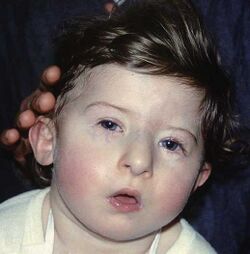Immunological examination
From WikiLectures
Immunological testing is indicated when an immune system disorder is suspected, to monitor treatment and possibly to screen families. The immune system disorders may present with recurrent infections that are prolonged, complicated or atypical and recurrent, or involve opportunistic microorganisms. [1]
Basic immunological examinations[edit | edit source]
- personal and family history (primary immunodeficiencies are genetic);
- clinical examination (lymphoid tissue hypoplasia,..);
- blood count and differential (quantitative disorders of immunocompetent cells):
- thrombocytopenia → Wiskott-Aldrich syndrome;
- neutropenia → severe congenital Kostmann neutropenia, cyclic neutropenia,...;
- neutrophil defect → Chédiak-Higashi syndrome;
- FW, CRP
- serum protein electrophoresis (approximate antibody quantity - absence or reduction of γ-fraction);
- immunological examination;
- microbiological examination (according to the spectrum of causative agents, the affected immune component can be inferred):
- defects of antibody immunity → susceptibility to infections with encapsulated microbes (pneumococci, streptococci),
- combined and cellular deficiencies → susceptibility to infections with viruses, fungi and opportunistic microbes,
- defects of phagocytic cells → infections, especially with staphylococci and fungi,
- disorders of some complements → pyogenic infections and neisseria infections
- molecular genetic examination;
Examination of humoral immunity[edit | edit source]
- concentration of serum immunoglobulins (IgG, IgA, IgM, IgE);
- primary immunodeficiencies: Autosomal inherited agamaglobulinemia, Bruton's X-linked agamaglobulinemia, Selective IgA deficiency, IgM hyperimmunoglobulinemia syndrome
- secondary immunodeficiencies: nephrotic syndrome, burns, polytrauma, malnutrition, hematological malignancies, immunosuppressive therapy,..
- determination of IgG subclasses;
- reduction of IgG1 - nephrotic syndrome; IgG2 defect → pneumococcal, meningococcal, H. influenzae infections; IgG3 defect → sinusitis and otitis in children; IgG4 defect usually accompanied by IgG2 reduction;
- isohemagglutinin (anti-A, anti-B) testing - IgM function testing;
- determination of specific antibodies after vaccination (diphtheria, tetanus, pneumococcus,..) - ability to form memory B-lymphocytes;
- B-lymphocyte count, typing, in vitro stimulation (functional test);
- deficiency of B-cells → agamaglobulinemia.
Examination of cellular immunity[edit | edit source]
- number of T-lymphocytes, number of CD4 (helper) and CD8 (cytotoxic) and their ratio (immunoregulation index);
- absence of T-lymphocytes → Severe combined immunodeficiency (SCID);
- functional assays: test for the ability of lymphocyte proliferation to be stimulated by non-specific mitogens and specific antigens ("blastic transformation", i.e., conversion of cells to the active stage);
- skin tests with tetanus, diphtheria, mumps antigens, ...- test of antigen-specific memory of T-lymphocytes and function of antigen presenting cells (late hypersensitivity reaction);
- HLA typing;
- cytokines - examination of T-lymphocyte dysfunction (only in specialized laboratories).
Examination of phagocytosis[edit | edit source]
- bactericidal tests,
- oxygen radical production tests,
- phenotypic analysis of important molecules on polymorphonuclear lymphocytes
Complement testing[edit | edit source]
- quantitative determination of individual components (C3, C4, CH50, Ap50) and functional test
- CH50 – total serum hemolytic activity, requiring normal complement levels;
- Ap50 – activity alternative complement pathways (in specialized laboratories );
- lower C3 →infection with gram-negative microorganisms.[1][3][2]
Autoantibody testing[edit | edit source]
Allergological examination[edit | edit source]
- total IgE, specific IgE, ECP (eosinophil cationic protein),...
Links[edit | edit source]
Related articles[edit | edit source]
- Laboratory testing of cellular immunity
- Primary immunodeficiency - Cellular immunity defects - Humoral immunity defects - Severe combined immunodeficiency
- Child immunological development - Immunodeficiency disorders - Immunodeficiency
References[edit | edit source]
- ↑ a b c LEBL, J – JANDA, J – POHUNEK, P, et al. Klinická pediatrie. 1. edition. Galén, 2012. 698 pp. pp. 226-227. ISBN 978-80-7262-772-1.
- ↑ a b KLIEGMAN, Robert M. – MARCDANTE, Karen J. – JENSON, Hal B.. Nelson Essentials of Pediatrics. 5. edition. China : Elsevier Saunders, 2006. pp. 366-369. ISBN 978-0-8089-2325-1.
- ↑ MUNTAU, Ania Carolina. Pediatrie. 4. edition. Praha : Grada, 2009. pp. 214. ISBN 978-80-247-2525-3.


